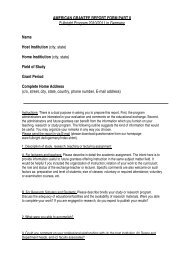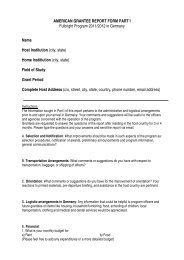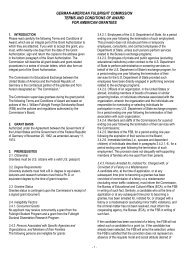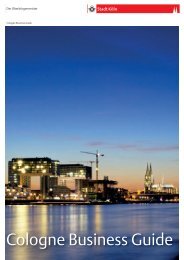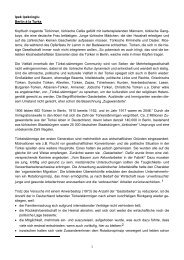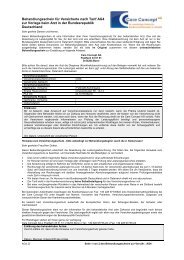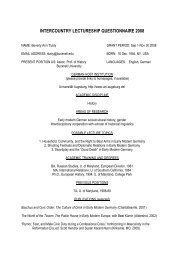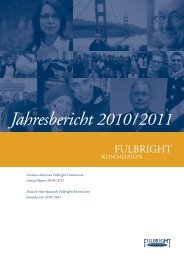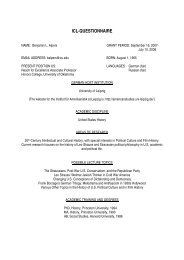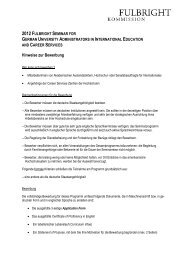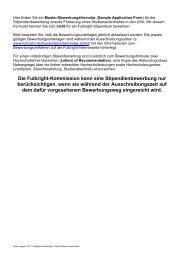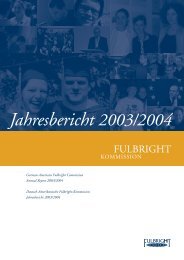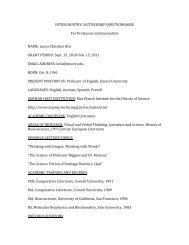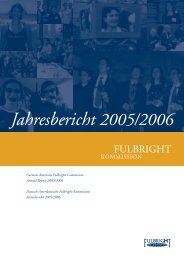A Brief History of the German-American Fulbright Program.d…
A Brief History of the German-American Fulbright Program.d…
A Brief History of the German-American Fulbright Program.d…
You also want an ePaper? Increase the reach of your titles
YUMPU automatically turns print PDFs into web optimized ePapers that Google loves.
A <strong>Brief</strong> <strong>History</strong> <strong>of</strong> <strong>the</strong> <strong>German</strong>-<strong>American</strong> <strong>Fulbright</strong> <strong>Program</strong>, 1952-2002 James F. Tent<br />
A <strong>Brief</strong> <strong>History</strong> <strong>of</strong> <strong>the</strong> <strong>German</strong>-<strong>American</strong> <strong>Fulbright</strong> <strong>Program</strong>, 1952-2002<br />
The original <strong>Fulbright</strong> Agreement<br />
James F. Tent<br />
University <strong>of</strong> Alabama at Birmingham<br />
Headquartered in Berlin since 1998, <strong>the</strong> <strong>German</strong>-<br />
<strong>American</strong> <strong>Fulbright</strong> <strong>Program</strong> has developed into one <strong>of</strong> <strong>the</strong><br />
most active and influential <strong>of</strong> <strong>the</strong> binational educational<br />
exchange programs operating under <strong>the</strong> <strong>Fulbright</strong> umbrella.<br />
Every year it sends hundreds <strong>of</strong> <strong>German</strong> students, scholars,<br />
and educators to <strong>the</strong> United States and hosts an equally large<br />
and distinguished group <strong>of</strong> <strong>American</strong> students, scholars, and<br />
educators at <strong>German</strong>y’s institutions <strong>of</strong> higher learning. The<br />
prominence <strong>of</strong> <strong>the</strong> <strong>German</strong>-<strong>American</strong> <strong>Fulbright</strong> <strong>Program</strong> in <strong>the</strong><br />
world <strong>of</strong> scholarly exchange is intimately tied to modern<br />
<strong>German</strong> history.<br />
Following World War II, when <strong>the</strong> United States joined in occupying a defeated <strong>German</strong>y,<br />
<strong>of</strong>ficials in its Office <strong>of</strong> Military Government (OMGUS) discovered that most <strong>German</strong> citizens had<br />
been isolated from <strong>the</strong> rest <strong>of</strong> <strong>the</strong> world for at least half a generation. Starting with <strong>the</strong> notion <strong>of</strong><br />
“re-education” <strong>of</strong> a former enemy, followed by a gentler “re-orientation” concept a few years later,<br />
OMGUS and U.S. State Department <strong>of</strong>ficials conceived a foreign policy program for sending<br />
<strong>German</strong>s, especially civic leaders open to democratic ideals and possessing leadership potential,<br />
to <strong>the</strong> United States at public expense to witness democracy in action. This exchange program<br />
was launched in 1947, and within six years nearly 10,000 young <strong>German</strong>s “experienced” <strong>the</strong><br />
United States, many <strong>of</strong> <strong>the</strong>m attending universities <strong>the</strong>re. Upon returning to <strong>German</strong>y, many went<br />
on to build prominent careers in <strong>the</strong> public and private sectors.<br />
At virtually <strong>the</strong> same time, a freshman senator from<br />
Arkansas, J. William <strong>Fulbright</strong>, initiated a new program in <strong>the</strong><br />
United States intended to bring <strong>American</strong>s out <strong>of</strong> <strong>the</strong>ir own<br />
brand <strong>of</strong> cultural isolation and to connect students and<br />
scholars worldwide on a basis <strong>of</strong> equality. A Rhodes Scholar<br />
worried that so few <strong>American</strong>s had studied abroad or<br />
experienced foreign cultures, <strong>Fulbright</strong>, who was pr<strong>of</strong>oundly<br />
moved by <strong>the</strong> bombings <strong>of</strong> Hiroshima and Nagasaki,<br />
conceived <strong>of</strong> an imaginative new use <strong>of</strong> <strong>the</strong> obscure War<br />
Surplus Property Act <strong>of</strong> 1944. His idea was to use a portion <strong>of</strong><br />
Senator <strong>Fulbright</strong><br />
<strong>the</strong> monetary credits derived from war surplus overseas to send young scholars abroad with <strong>the</strong><br />
<strong>German</strong>-<strong>American</strong> <strong>Fulbright</strong> Commission 1 <strong>of</strong> 6
A <strong>Brief</strong> <strong>History</strong> <strong>of</strong> <strong>the</strong> <strong>German</strong>-<strong>American</strong> <strong>Fulbright</strong> <strong>Program</strong>, 1952-2002 James F. Tent<br />
twin goals <strong>of</strong> advancing knowledge and fur<strong>the</strong>ring mutual understanding. A convincing advocate<br />
and skilled political strategist, <strong>Fulbright</strong> won over <strong>the</strong> initially hesitant Congress, Treasury, and<br />
State Department, and on August 1, 1946 President Truman signed <strong>of</strong>f on <strong>the</strong> P.L. 584<br />
Amendment. Using State Department infrastructure for support, <strong>the</strong> program set up an<br />
independent Board <strong>of</strong> Foreign Scholarships (renamed <strong>the</strong> J. William <strong>Fulbright</strong> Foreign<br />
Scholarship Board in 1991) so that participating nations could select qualified scholars and<br />
educators to visit <strong>the</strong> U.S. while <strong>the</strong> BFS would choose young scholars to send abroad.<br />
Known as <strong>the</strong> <strong>Fulbright</strong> Act, <strong>the</strong><br />
program was destined in <strong>German</strong>y’s case to<br />
overtake <strong>the</strong> exchange program in <strong>the</strong><br />
<strong>American</strong> Zone, elevating <strong>the</strong> underlying<br />
purpose <strong>of</strong> <strong>the</strong> exchange from postwar re-<br />
orientation to genuine partnership. The<br />
<strong>Fulbright</strong> Exchange <strong>Program</strong> began operation<br />
in 1948, first targeting former Allied nations that<br />
were recovering most rapidly from <strong>the</strong> war. The<br />
possibility <strong>of</strong> creating a <strong>German</strong> <strong>Fulbright</strong><br />
top: The first <strong>German</strong> grantees<br />
bottom: 1953 <strong>American</strong> grantees<br />
buying eel on <strong>the</strong> Rhine<br />
Adenauer and McCloy signing <strong>the</strong> <strong>Fulbright</strong> Agreement<br />
in 1952<br />
<strong>Program</strong> was first addressed in 1949 after <strong>the</strong> establishment <strong>of</strong> <strong>the</strong> Federal Republic <strong>of</strong><br />
<strong>German</strong>y. Chancellor Konrad Adenauer and U.S. High Commissioner John J. McCloy entered<br />
into lengthy negotiations, but because <strong>the</strong> Federal Republic had not yet attained full sovereignty<br />
and because <strong>of</strong> funding intricacies and legal issues delays ensued. The United States signed <strong>the</strong><br />
(<strong>Fulbright</strong>) Executive Agreement with <strong>the</strong> Federal Republic on July 18, 1952, and <strong>the</strong> binational<br />
<strong>Fulbright</strong> Commission came into existence.<br />
Beginning with <strong>the</strong> academic year 1953-54,<br />
approximately 200 <strong>American</strong> graduate students, twenty<br />
teachers, and a handful <strong>of</strong> senior scholars arrived in <strong>German</strong>y,<br />
while a comparable group <strong>of</strong> <strong>German</strong> students, teachers, and<br />
senior scholars traveled to <strong>the</strong> United States. From its<br />
inception, <strong>the</strong> program was a great success, as evidenced by<br />
<strong>the</strong> summary reports submitted by participants at <strong>the</strong><br />
conclusion <strong>of</strong> <strong>the</strong>ir year-long programs.. On both sides, <strong>the</strong><br />
participants found <strong>the</strong>ir Weltanschauung and <strong>the</strong>ir<br />
understanding <strong>of</strong> people (as distinct from nations)<br />
immeasurably widened, just as Senator <strong>Fulbright</strong> had so<br />
fervently wished.<br />
Given its robust economy and <strong>the</strong> availability <strong>of</strong> war<br />
<strong>German</strong>-<strong>American</strong> <strong>Fulbright</strong> Commission 2 <strong>of</strong> 6
A <strong>Brief</strong> <strong>History</strong> <strong>of</strong> <strong>the</strong> <strong>German</strong>-<strong>American</strong> <strong>Fulbright</strong> <strong>Program</strong>, 1952-2002 James F. Tent<br />
surplus funds, <strong>the</strong> United States had unilaterally funded <strong>the</strong><br />
worldwide <strong>Fulbright</strong> Exchange, including <strong>the</strong> program with <strong>the</strong><br />
Federal Republic. However, as <strong>the</strong> original war surplus<br />
sources declined, <strong>the</strong> U.S. Congress passed new legislation<br />
in 1961: <strong>the</strong> <strong>Fulbright</strong>-Hays Act. This act widened <strong>the</strong> scope<br />
<strong>of</strong> <strong>the</strong> program to include binational cost-sharing. The<br />
following year, as a token <strong>of</strong> gratitude and an indication <strong>of</strong> its<br />
economic recovery, <strong>German</strong>y entered into a cost-sharing<br />
<strong>Fulbright</strong> agreement, <strong>the</strong> first nation to do so. The <strong>German</strong><br />
government has paid approximately half <strong>of</strong> all expenditures<br />
connected to <strong>the</strong> <strong>Fulbright</strong> exchange ever since. This critically<br />
important development in <strong>the</strong> worldwide <strong>Fulbright</strong> concept<br />
helps explain <strong>the</strong> program’s vitality over five decades.<br />
President Kennedy and Senator<br />
<strong>Fulbright</strong> at <strong>the</strong> 15th Anniversary <strong>of</strong><br />
<strong>the</strong> <strong>Fulbright</strong> <strong>Program</strong> in 1961<br />
<strong>German</strong>y’s pioneering cost-sharing plan guaranteed that <strong>the</strong> <strong>Program</strong> would become a genuinely<br />
reciprocal process, and it fulfilled one <strong>of</strong> Senator <strong>Fulbright</strong>’s earliest goals <strong>of</strong> sharing and equal<br />
responsibility. Soon, o<strong>the</strong>r participating nations followed <strong>the</strong> Federal Republic’s example.<br />
<strong>German</strong>y’s <strong>Program</strong> was also helped by <strong>the</strong> expertise <strong>of</strong> several long-serving and skillful persons<br />
such as <strong>American</strong> Carl G. Anthon and <strong>German</strong> Ulrich Littmann, to name only two dedicated<br />
<strong>of</strong>ficials.<br />
From <strong>the</strong> outset, <strong>the</strong> <strong>German</strong>-<strong>American</strong> <strong>Fulbright</strong> Commission instituted certain rules for<br />
<strong>the</strong> selection <strong>of</strong> participants from <strong>the</strong> Federal Republic and later a reunited <strong>German</strong>y. First, it<br />
created a highly visible, merit-based competition to select outstanding candidates in all <strong>of</strong> <strong>the</strong><br />
recognized scholarly and scientific fields. The preamble to <strong>the</strong> 1952 Agreement echoed <strong>the</strong><br />
original <strong>Fulbright</strong> concept <strong>of</strong> 1946, specifically seeking participants with <strong>the</strong> ability to “promote<br />
fur<strong>the</strong>r mutual understanding between <strong>the</strong> peoples <strong>of</strong> <strong>the</strong> United States <strong>of</strong> America and <strong>the</strong><br />
Federal Republic <strong>of</strong> <strong>German</strong>y by a wider exchange <strong>of</strong> knowledge and pr<strong>of</strong>essional talents through<br />
educational contacts.”<br />
From <strong>the</strong> start, <strong>the</strong> Commission in Bonn had five <strong>American</strong> and five <strong>German</strong> members,<br />
each group exercising equal responsibility and selecting its membership by its own national<br />
process. On <strong>the</strong> <strong>German</strong> side, <strong>the</strong> <strong>Fulbright</strong> Commission typically selected representatives from<br />
<strong>the</strong> Ministry <strong>of</strong> Education, <strong>the</strong> <strong>German</strong> University Presidents Conference, <strong>the</strong> <strong>German</strong> Academic<br />
Exchange Service, one alternating, representative university, and later a university student<br />
organization, preferably a <strong>Fulbright</strong> returnee. The rigorous selection process allowed <strong>German</strong><br />
<strong>Fulbright</strong> participants to rebuild <strong>the</strong>ir nation’s reputation for academic excellence. Equally<br />
important, <strong>the</strong>y became un<strong>of</strong>ficial ambassadors for peace.<br />
O<strong>the</strong>r indications <strong>of</strong> <strong>the</strong> high national priority assigned to <strong>the</strong> <strong>Fulbright</strong> program in<br />
<strong>German</strong>y abounded. With <strong>the</strong> implementation <strong>of</strong> <strong>the</strong> 1962 agreement, <strong>German</strong>y’s Minister <strong>of</strong><br />
<strong>German</strong>-<strong>American</strong> <strong>Fulbright</strong> Commission 3 <strong>of</strong> 6
A <strong>Brief</strong> <strong>History</strong> <strong>of</strong> <strong>the</strong> <strong>German</strong>-<strong>American</strong> <strong>Fulbright</strong> <strong>Program</strong>, 1952-2002 James F. Tent<br />
Foreign Affairs became an ex-<strong>of</strong>ficio honorary co-chairperson <strong>of</strong> <strong>the</strong> Commission and was entitled<br />
to perform <strong>the</strong> same functions as <strong>the</strong> U.S. Secretary <strong>of</strong> State, such as budget approval and<br />
authorization <strong>of</strong> <strong>the</strong> Annual <strong>Program</strong> Plan. <strong>German</strong>y’s Federal Government covered most <strong>of</strong> <strong>the</strong><br />
costs for <strong>German</strong> participants, although individual states and o<strong>the</strong>r local <strong>German</strong> institutions also<br />
supported <strong>the</strong> national enterprise.<br />
<strong>Fulbright</strong> postage stamp issued 1996<br />
Given Berlin’s special status in <strong>the</strong> context <strong>of</strong> <strong>the</strong> Cold<br />
War, <strong>the</strong> <strong>Fulbright</strong> Commission noticed early on that <strong>American</strong><br />
participants who studied and researched in Berlin eagerly<br />
reported a unique atmosphere <strong>the</strong>re. In 1954, <strong>the</strong> <strong>Fulbright</strong><br />
<strong>Program</strong> instituted a “Berlin Week” for all <strong>Fulbright</strong><br />
participants, a ga<strong>the</strong>ring that attracted national attention. For<br />
example, in March 1986, Federal President Richard von<br />
Weizäcker addressed <strong>the</strong> Berlin attendees in person, praising<br />
<strong>the</strong> program’s commitment to a binational partnership that<br />
carried worldwide implications. Thus, in <strong>German</strong>y <strong>the</strong><br />
<strong>Fulbright</strong>-Kommission has probably achieved a higher<br />
visibility in governmental circles than has its <strong>American</strong><br />
counterpart, in part because <strong>German</strong>y’s senior political<br />
leadership views cultural relations as a “third pillar” <strong>of</strong> foreign<br />
policy. Ano<strong>the</strong>r Federal President, Karl Carstens, noted in<br />
1978 <strong>the</strong> enduring legacy bequea<strong>the</strong>d by Senator <strong>Fulbright</strong>, commenting that “those among us<br />
who are familiar with <strong>the</strong> general discussion <strong>of</strong> [<strong>German</strong>] cultural foreign policy will perceive…that<br />
<strong>the</strong> work <strong>of</strong> <strong>the</strong> <strong>Fulbright</strong>-Kommission is based on a concept <strong>of</strong> cultural politics that is closely tied<br />
to <strong>the</strong> terms <strong>of</strong> ‘an expanded definition <strong>of</strong> culture’ from which our current cultural foreign relations<br />
are formed.” His definition encompasses no less than “<strong>the</strong> entire range <strong>of</strong> living reality; extends<br />
from literature to technology, from issues <strong>of</strong> social policies to problems <strong>of</strong> environmental<br />
protection; it includes <strong>the</strong> past and present with a view towards future challenges.”<br />
The <strong>German</strong>-<strong>American</strong> <strong>Fulbright</strong> <strong>Program</strong> has created a sizable body <strong>of</strong> influential<br />
<strong>German</strong> citizens highly knowledgeable about <strong>the</strong> United States and a comparable body <strong>of</strong><br />
<strong>American</strong> citizens with great knowledge <strong>of</strong> <strong>German</strong>y. One spin-<strong>of</strong>f <strong>of</strong> <strong>the</strong>se developments is that<br />
each country in <strong>the</strong> binational program has helped to develop a large and respectable<br />
historiographical literature about <strong>the</strong> o<strong>the</strong>r, and that <strong>American</strong> Studies, once a rarity in <strong>German</strong>y,<br />
is now commonplace in university curricula. This is in marked contrast to pre-1945 developments<br />
when mutual ignorance <strong>of</strong> <strong>the</strong>ir opposite nations, even in centers <strong>of</strong> higher learning, was <strong>the</strong><br />
norm. The <strong>German</strong>-<strong>American</strong> <strong>Fulbright</strong> <strong>Program</strong> has engendered many o<strong>the</strong>r positive<br />
developments great and small; <strong>the</strong> illustrious career <strong>of</strong> <strong>German</strong> <strong>Fulbright</strong> participant Gerhard<br />
Casper serves as one example. A legal scholar, he built his career in <strong>the</strong> United States, capping it<br />
<strong>German</strong>-<strong>American</strong> <strong>Fulbright</strong> Commission 4 <strong>of</strong> 6
A <strong>Brief</strong> <strong>History</strong> <strong>of</strong> <strong>the</strong> <strong>German</strong>-<strong>American</strong> <strong>Fulbright</strong> <strong>Program</strong>, 1952-2002 James F. Tent<br />
with a distinguished presidency at Stanford University from 1992 to 2000. Thousands <strong>of</strong> o<strong>the</strong>r<br />
<strong>German</strong> <strong>Fulbright</strong> participants have helped broaden international contacts too, among <strong>the</strong>m a<br />
young <strong>German</strong>ist who taught public school in New Jersey in <strong>the</strong> late 1950s. One <strong>of</strong> his pupils, this<br />
author, became so enamored <strong>of</strong> <strong>German</strong> culture that he pursued a career in <strong>German</strong> history. He,<br />
like countless o<strong>the</strong>r <strong>German</strong> and <strong>American</strong> citizens, is, through <strong>the</strong> “multiplier principle” also a<br />
beneficiary <strong>of</strong> <strong>the</strong> “<strong>Fulbright</strong> experience.”<br />
<strong>Fulbright</strong>ers left <strong>the</strong>ir mark on Berlin<br />
Following <strong>German</strong> reunification in 1990,<br />
<strong>the</strong> <strong>German</strong>-<strong>American</strong> <strong>Fulbright</strong> <strong>Program</strong><br />
extended its operations to institutions <strong>of</strong> higher<br />
learning in <strong>the</strong> eastern states <strong>of</strong> <strong>the</strong> former<br />
GDR. Since <strong>the</strong>n hundreds <strong>of</strong> exceptional<br />
students, educators, lecturers, and scholars<br />
from those once culturally isolated regions have<br />
traveled to <strong>the</strong> United States while <strong>American</strong><br />
participants have studied and experienced life<br />
in cities such as Dresden, Leipzig, and<br />
Rostock. They, too, have become full partners in <strong>the</strong> “<strong>Fulbright</strong> experience” and will undoubtedly<br />
have a major impact on society and on <strong>the</strong> integration <strong>of</strong> those parts <strong>of</strong> <strong>German</strong>y that were<br />
isolated for so long.<br />
In 1996 when <strong>the</strong> worldwide <strong>Fulbright</strong> <strong>Program</strong> celebrated its fiftieth anniversary, its<br />
leadership estimated that a quarter <strong>of</strong> a million participants had gone through <strong>the</strong> <strong>Fulbright</strong><br />
programs (now over 300,000) and had organized into a<br />
worldwide fraternity <strong>of</strong> men and women who share <strong>the</strong><br />
program’s enduring goals <strong>of</strong> advancing knowledge and<br />
promoting international cooperation. On that occasion, <strong>the</strong>y<br />
quoted former <strong>German</strong> <strong>Fulbright</strong> staff and board member Karl<br />
C. Roel<strong>of</strong>fs, who reminded <strong>the</strong> <strong>American</strong>s that it is<br />
“impossible to conceive <strong>of</strong> <strong>the</strong> <strong>American</strong> government being<br />
able to succeed without its ability to draw on <strong>the</strong> United<br />
States’ unique system <strong>of</strong> higher education. <strong>American</strong> colleges<br />
and universities with <strong>the</strong>ir commitment to access, intellectual<br />
rigor, creativity and excellence, served as models for<br />
advancing learning elsewhere and in <strong>the</strong> process developed a<br />
global market for educational change.” The <strong>German</strong>-<strong>American</strong><br />
<strong>Fulbright</strong> <strong>Program</strong>, one <strong>of</strong> <strong>the</strong> largest in <strong>the</strong> world, has made<br />
a comparable impact on society, and it shares Senator<br />
<strong>Fulbright</strong>’s enduring goal. He said it best: “…We must seek<br />
Colin Powell speaking at <strong>the</strong><br />
celebration <strong>of</strong> <strong>the</strong> 50th Anniversary<br />
<strong>of</strong> <strong>the</strong> <strong>German</strong>-<strong>American</strong> <strong>Fulbright</strong><br />
<strong>Program</strong><br />
<strong>German</strong>-<strong>American</strong> <strong>Fulbright</strong> Commission 5 <strong>of</strong> 6
A <strong>Brief</strong> <strong>History</strong> <strong>of</strong> <strong>the</strong> <strong>German</strong>-<strong>American</strong> <strong>Fulbright</strong> <strong>Program</strong>, 1952-2002 James F. Tent<br />
through education to develop empathy, that rare and wonderful ability to perceive <strong>the</strong> world as<br />
o<strong>the</strong>rs see it” Decent behavior, he observed, stems from perceiving o<strong>the</strong>rs as individual human<br />
beings; barbarism can result from perceiving an adversary abstractly, as <strong>the</strong> embodiment <strong>of</strong> some<br />
evil design. As recent tragic events have shown, <strong>the</strong> need for international tolerance,<br />
understanding, and cooperation remains as great now as it was after World War II, when a<br />
freshman senator from Arkansas initiated <strong>the</strong> program that bears his name.<br />
- James Tent is a pr<strong>of</strong>essor for <strong>German</strong> history at <strong>the</strong> University <strong>of</strong> Alabama at Birmingham.<br />
<strong>German</strong>-<strong>American</strong> <strong>Fulbright</strong> Commission 6 <strong>of</strong> 6



